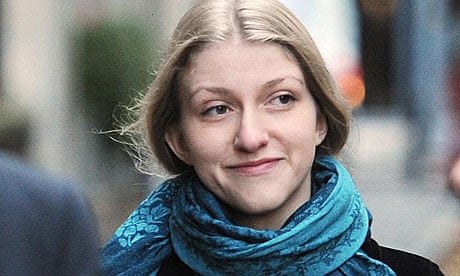A 26-year-old Russian woman and former Commons researcher on Tuesday strongly denied she spied for Moscow and accused MI5 of providing no evidence to support the home secretary's case that she should be deported.
During more than five hours of evidence, devoted more to her personal life than espionage, Katia Zatuliveter described MI5's claims as "laughable" at a hearing of the special immigration appeals commission (Siac) in London.
At the end of sharp exchanges, Jonathan Glasson, for the home secretary, accused Zatuliveter of lying and said she had spied for Russia "from the heart of British democracy in parliament".
The former aide to Mike Hancock, Liberal Democrat MP for Portsmouth South, replied: "I have never done that. I don't believe MI5 is so unprofessional. It has not come up with any evidence."
Her activities ensured "Russia's eyes and ears [were] in the heart of the House of Commons", said Glasson. "That's laughable," replied Zatuliveter. "I have done nothing wrong. I have nothing to hide." She said she was "just uncomfortable talking about my private life".
The Siac panel chaired by Mr Justice Mitting, and including Sir Stephen Lander, a former head of MI5, heard how she had a series of lovers whom she first met when acting as a chaperone at international conferences in St Petersburg, where she had been a student.
She said she started a diary in 2004 because she "felt lonely". She had a "crush" on a Dutch diplomat identified as L. After flirting with a member of a Serbian-Montenegrin delegation she struck up a relationship with Hancock which lasted from June 2006 to March 2010. When that broke off, she started a relationship with Y, a European official who worked in Nato.
Under questioning, she described six meetings in London with MI5 officers – named as Stephen and Louise – in 2009 and 2010. They asked her about her meetings with two people from the Russian embassy, including one identified as "Boris" whom she met at a meeting at the International Institute for Strategic Studies in central London.
Zatuliveter dismissed Glasson's suggestions that she fitted the profile of an ideal recruit for Russian intelligence.
She said she wanted to stay in Britain because she was innocent. Her counsel, Tim Owen QC, described MI5's case as based on a "series of crude stereotypes".
Zatuliveter was arrested at the end of last year when she was working for Hancock, a member of the Commons defence committee.
MI5 relied on "only one alleged specific fact", namely that she met a Russian intelligence officer, operating from the diplomatic mission in London, at parliamentary offices in Westminster on 19 December 2008, Owen said. MI5 now said Zatuliveter "may have" met a Russian intelligence officer that day, he added.
Her bail conditions were relaxed this year so she could apply for work, including a post at RTTV, a Russian state-funded television station.
She was stopped at Gatwick airport in August last year and arrested in December amid claims she was engaged in espionage. She has denied the allegations, saying she has never worked for Russian intelligence services. MI5 alleges she supplied sensitive information to the SVR, Russia's foreign intelligence agency.
Hancock has defended his decision to employ her. "There were no dodgy deals, no favours and no shortcuts. I'm not naive," he said when she was arrested. Tessa Gregory, of Public Interest Lawyers, said outside court: "I have no doubt that my client, who has acted with complete openness throughout these proceedings, is not and never has been a Russian spy."
Mitting said last month he had personally chosen Lander to hear the case. "We need to have some expertise," he said. It is the first time Siac is hearing a case alleging espionage.
Owen argued that there was a "very obvious and real possibility of bias, which makes his [Lander's] position on the panel wholly untenable".
The hearing continues.
